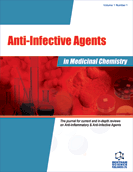Abstract
Anti-malarial chemotherapy based on a limited number of drugs has been the mainstay of malaria control for many decades. However, the lack of new effective and affordable drugs and the emergence and spread of drug resistant parasites is seriously hindering treatment strategies, and is contributing to the resurgence of malaria, especially that caused by Plasmodium falciparum. Present knowledge indicates that drug resistance in malaria emerges through selection of parasites harbouring genetic mutations that confer a selective advantage over sensitive parasites in the presence of drug pressure. Resistance to antifolates such as Fansidar®, (pyrimethamine in combination with sulphadoxine), is known to be caused by mutations in the genes encoding the drugs therapeutic targets, dihydrofolate reductase (DHFR) and dihydropteroate synthase (DHPS). In the case of quinoline-based compounds, such as chloroquine and mefloquine, resistance is thought to be dependent on the exclusion of the drug from the site of action. This has been shown to be mediated by mutations in two genes denoted pfmdr1 and pfcrt, which encode proteins localized on the membrane of the parasitophorous food vacuole where these drugs are thought to act. In recent years, heath authorities have been increasingly recommending the use of Artemisinin Combination Treatment (ACT) in an effort to halt the spread of antimalarial drug resistance. Resistance to artemisinin derivatives has not yet been reported in natural human parasite populations, but it has already been achieved in rodent malaria models suggesting it may arise also in P. falciparum. Major focus should now be aimed at understanding the mechanisms of resistance to artemisinin derivatives before it becomes a serious public health problem. The post-genomic era of malaria has opened unprecedented opportunities for a better understanding of drug resistance mechanisms and consequently, for rational design of novel compounds less prone to resistance.
Keywords: Malaria, drug resistance, mechanisms, genomics, proteomics
 25
25





















